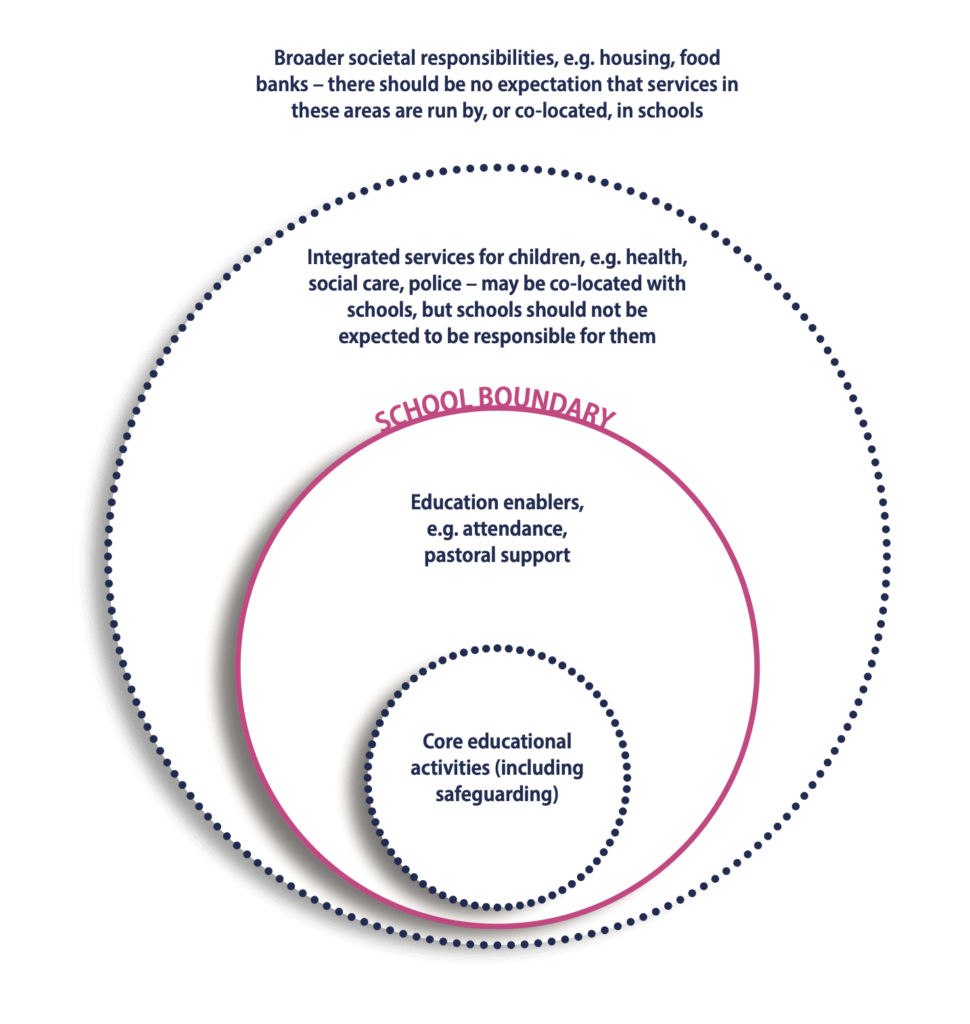Ministers must be “explicit” about the role they expect schools to play in their communities as “underfunded wider public services crumble around them”, a school leaders’ union has said.
The Association for School and College Leaders (ASCL) has published its roadmap for a sustainable education system today.
It explores what schools should be responsible for as they are “increasingly being expected to expand their remit and provide support and services to pupils and families which go far beyond teaching and learning”.
A year-long consultation with ASCL council, made up of 60 school leaders, compiled lists of services which schools and colleges are currently providing.
It concluded that core educational activities, including safeguarding, and “education enablers” such as attendance and pastoral support should be carried out by schools.
But “broader societal responsibilities” like running food banks, health checks or helping families with housing issues should not be expected of schools, the report said.
The union has called for the government to be more “explicit” about schools’ potential role as community hubs and to give them appropriate funding.
‘Not sustainable’
The report pointed out the last Labour government wanted a “more holistic approach, with schools at the centre”.
This “contrasts sharply with the approach of the subsequent coalition and Conservative governments which, at least in theory, wanted schools to focus on teaching and learning, with broader children’s services sitting separately”.
But the pandemic, austerity measures and cost of living crisis have created “a situation in which schools and colleges are not officially recognised or resourced to provide broader services, but are having to do so anyway as underfunded wider public services crumble around them.
“This is not sustainable.”
The report went on to say it was “not yet entirely clear which of these models the current government favours, or indeed whether it has a different conception again of the role of schools and colleges.
“It is essential that the government is clear about this, and that it puts in place funding and accountability mechanisms which properly reflect its approach.”
What responsibilities should schools have?
ASCL categorised core teaching responsibilities as “green”, including providing a broad and rich curriculum, assessments, school libraries and teaching of “life skills”.
Other expectations placed on schools were around attendance and behaviour and safety of pupils on site, providing nutritional food to all pupils, and ensuring high quality leadership, market and growth planning.

Another category of responsibilities were “yellow”. These were services that schools or colleges could be reasonably expected to be responsible for if resourced properly, depending on the type of education setting.
Providing children with technology, dealing with complaints, supporting pupils’ mental and physical health, personal hygiene and sexual health were included as examples.
What responsibilities shouldn’t schools have?
Services schools shouldn’t be providing are labelled in “pink”, and include mental and physical health support of pupils’ families, safety of pupils travelling to and from school, toilet training and nappy changing and pupil behaviour on social media out of school hours.

Other services like running food banks, resolving local parking issues, supporting families with housing and benefits and fundraising should also not be expected of schools, according to the report.
‘Clear, long-term strategic plan’
ASCL council has made a wide range of recommendations for the model to work. It called on government to develop a “clear, long-term strategic plan for education’, similar to what has been done for the NHS.
The government should also implement an effective child poverty strategy, give sufficient funding for core activities in schools, colleges and trusts and make “proper reinvestment” into wider children’s services, the report says.
Other recommendations call for the government to implement effective approaches to early years and SEND and introduce accountability measures for schools firmly based on their core responsibilities they have chosen to take on.
‘Strategic, joined-up, place-based strategy’
At local government level, ASCL has called for a “strategic, joined-up, place-based strategy which clearly maps out who is responsible for delivering the wide range of responsibilities across education, health and social care”.
Local government should also engage in conversations with school leaders as to whether they are willing to take on extra responsibilities, providing the funding when necessary.
Local authorities should also reduce administrative burdens on staff by reducing compliance reporting and data tracking, reducing assessment expectations and digitising systems.
Schools ‘left to pick up the pieces’

Julie McCulloch, ASCL director of strategy and policy, said: “In recent years the expectations on schools and colleges have grown way beyond teaching and learning to encompass a wide range of societal responsibilities.
“Some of this can be traced back to the pandemic, but also to high child poverty rates and crumbling public services, meaning that schools and colleges have been left to pick up the pieces.
“More needs to be done to clearly distinguish where the core responsibilities of education staff start and end. It is time to rethink exactly what we expect from schools and colleges and how they should be resourced to meet these demand.”








Your thoughts